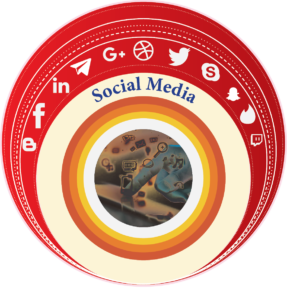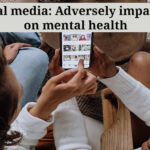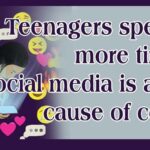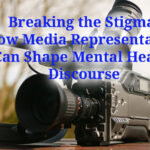The Darker Side of Social Media. Social media addiction is a compulsive behaviour that leads to negative effects like constantly checking the phone for updates and spending sleepless nights.
In less than two decades of its creation social media has become an inseparable part of our life. It once again stands to prove the fact that man is a social being. The launch of good quality phones in affordable prices and internet packages have further boosted the social media usage in India.
Social media helps us maintain connection with friends, family and professional contacts. It helps us create a persona of ourselves and makes us more accountable for our actions. The network of support provided through social media helps people achieve their goals. It helps us understand and accept various new trends in the norms of the society and find like minded individuals.


But why does using social media feel so good? The answer is Dopamine.
It is a feel-good hormone created inside our body. It is the same chemical which makes us feel good when we consume chocolate, alcohol, smoke or gamble. The lack of age restriction and ease of access has lead to a steep rise in the usage of social media, specially among the millennials. But though it is a driver for change there is a darker side of social media.
Social media addiction is something each of us are familiar with. Addiction is a compulsive behaviour that leads to negative effects. In this case constantly checking the phone for updates and spending sleepless nights. People build using virtual persona using social media and their happiness is linked to the appreciation of their peers. Lack of the desired response leads to low-self-esteem and in certain cases causes depression.
In a time where there is increasing stress from educational institutes and family teenagers today try and use social media as a coping mechanism. They utilize social media to create an ideal personality to try and become highly self-involved that often cannot relate to the realities of life. They are more prone to addiction and it can affect their functionality, which results in poor grades, unsuccessful relationships etc.
Coupled with constant posts from friends often leads in creating a sense of insecurity among the teenagers. It false sense of accomplishment becomes hardwired in their brain and as they age they fail to form meaningful relationships and often leads to stress.
These traits are not specific to teenagers alone, even adults are often victims of social media addiction. It may be as innocent as clicking a photograph prior to ever meal, regular check-in, posts or stalking people. Social media has become more than a tool to communicate. The addiction to social media is stronger than that to drugs. A recent study revealed that people who tend to spend more time on social media are at a higher risk of depression. The social comparison, a belief that leads to inaccurate self-evaluation leads to identity crisis.
How to cope with social media addiction?
The first step towards the solution is the acceptance of the problem. It takes time and conscious effort into breaking the habit. Support of family and friends is equally important as it can help boost the morale. The first step would be to time the period of usage of social media allowing to create time for other activities. Substitute social media time into other activities like sports, hobbies, pets etc. These activities would lead to a more positive release and would help concentrate better.
It is important to realise that while social media is an important aspect it needs to be controlled or might lead to creation of a false sense of reality. It is important for parents to understand and help children release stress in a more positive manner


Dr. Naveen Jayaram
Department of Psychiatry, Sakra World Hospital, Bengaluru
Ph: 08049694969











